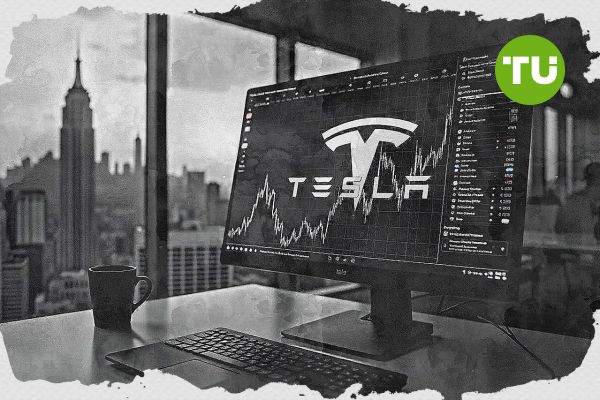Tesla stock gains 4.7% as robotaxi plans expand
 In terms of operations, Tesla delivered 384,122 vehicles in Q2 2025, down 13.5% year-over-year
In terms of operations, Tesla delivered 384,122 vehicles in Q2 2025, down 13.5% year-over-year
As of July 11, Tesla stock is trading at $309.87, up 4.7% in 24 hours as markets respond positively to CEO Elon Musk’s comments regarding the expansion of the company’s robotaxi service.
Highlights
- Tesla stock jumped 4.7% on July 11 following news of expanded robotaxi deployment plans.
- Despite the rebound, the stock remains below key moving averages, with $285 as critical support.
- Investor concerns persist over CEO Elon Musk’s political involvement and weakening quarterly vehicle deliveries.
The rebound comes after several days of pressure on the stock due to a broader risk-off sentiment and renewed concerns over Musk’s political ambitions, which some investors fear could divert attention from Tesla’s core operations. Technically, TSLA remains in a precarious position. While the recent bounce is encouraging, the stock continues to trade below its 50-day moving average of $318 and significantly below its 200-day moving average, currently near $365.
This suggests that the broader trend remains bearish despite recent bullish sessions. The Relative Strength Index (RSI) remains weak, having recently dipped to its lowest levels since early June, indicating limited buying momentum. Tesla faces immediate support at $285, a level that previously marked the base of a consolidation pattern. A breach of this level could expose the stock to further downside toward $265 and, in a more bearish scenario, the $225 level—both of which served as critical inflection points in Q1 2024.

Tesla stock price dynamics (May 2025 - July 2025). Source: TradingView
On the upside, resistance is firmly in place at the 50-day moving average ($318), and stronger resistance is visible around $365, near the May swing high. Any move above these resistance zones would likely require a significant positive catalyst, such as a strong Q2 earnings beat or material regulatory progress on Tesla's autonomous initiatives.
Musk’s politics and product vision create mixed sentiment
Tesla’s stock has been buffeted not only by macro factors but also by Musk’s increasingly public foray into U.S. politics. Earlier this week, shares fell nearly 7% following Musk's announcement that he plans to establish a new political party—the “America Party”—and push for a broader political realignment. These moves have raised alarms among institutional investors who worry that the CEO's expanding public profile may become a distraction or polarizing force for the brand.
That said, investor reaction to Tesla’s product roadmap remains positive. Musk’s announcement on July 10 that Tesla will expand its robotaxi pilot from Austin to the Bay Area, pending regulatory approval, helped the stock recover from recent losses. The move demonstrates Tesla’s confidence in its Full Self-Driving (FSD) software and long-term strategy of mobility-as-a-service, which could ultimately transform the company's revenue model. However, the robotaxi rollout is still in its infancy, and regulatory hurdles remain a significant barrier to full commercialization.
In terms of operations, Tesla delivered 384,122 vehicles in Q2 2025, down 13.5% year-over-year, raising concerns about demand softness and inventory buildup. The company is set to report Q2 earnings on July 23, where investors will be keenly focused on margins, especially as price cuts and discounts continue to pressure profitability. The company’s annual shareholder meeting, scheduled for November 6, may also become a venue for more detailed discussion on both product and governance issues.
Expect range-bound trading with bearish bias
Looking ahead, Tesla’s share price is likely to remain range-bound between $285 and $318 over the next two weeks, barring any significant news catalysts. If support at $285 fails to hold, a decline toward $265 is the most probable scenario. On the other hand, a breakout above $318 would open the door for a test of the $340–$365 range, though this would require a positive earnings surprise or fresh institutional buying.
In short, while Musk's robotaxi vision adds long-term potential to Tesla’s valuation, near-term headwinds—including political distractions, weakening deliveries, and technical resistance—suggest that the stock is more likely to consolidate or pull back rather than stage a sustained rally. Investors should monitor the $285 level closely, as a breakdown there would likely accelerate selling pressure in the short term.
Elon Musk’s growing political involvement is making Tesla a more polarizing stock, prompting analysts at Wedbush and CFRA to revise their outlook. While his persona energizes retail investors, it’s raising reputational concerns among institutional shareholders.













































































































































